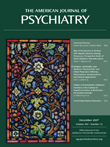5-HTT Binding in Recovered Depressed Patients and Healthy Volunteers: A Positron Emission Tomography Study With [ 11 C]DASB
Abstract
Objective: The serotonin transporter (5-HTT) is a key target for selective serotonin reuptake inhibitors and may be involved in the pathophysiology of major depression. It is now possible to image 5-HTT directly in the human brain, but results from studies of acutely depressed patients have been inconsistent. The purpose of this study was to determine whether abnormalities in 5-HTT might be present in recovered depressed patients. Method: The authors measured the binding potential of 5-HTT using [ 11 C]DASB in conjunction with positron emission tomography (PET) in 24 medication-free, recovered depressed male patients and 20 healthy male comparison subjects. The regional estimates of binding potential were obtained using a metabolite-corrected plasma input function method followed by Logan analysis, with the cerebellum as a reference region. Results: The authors found no significant difference in the binding potential of [ 11 C]DASB between the recovered depressed patients and healthy comparison subjects in any of the brain regions (amygdala, anterior cingulate cortex, caudate nucleus, frontal cortex, hippocampus, insula, thalamus, and dorsal raphe) studied. Conclusions: Men who recover from depression have normal availability of 5-HTT in brain regions thought to be involved in the pathophysiology of depression. The findings therefore do not support the proposal that recurrent depression is associated with long-standing deficits in 5-HTT.



